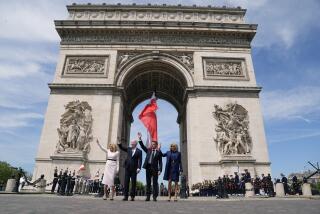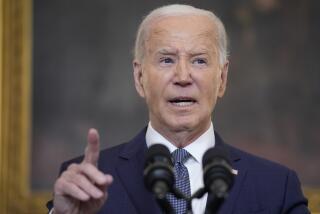Clinton Backs Plan to Divide Bosnia in Two
- Share via
PARIS — President Clinton, discussing the conflict in Bosnia-Herzegovina, told French leaders Tuesday that he supports a partition plan that would give Bosnian Serbs almost half of the former Yugoslav republic’s territory.
Clinton also said for the first time that he supports a U.N.-sponsored cease-fire plan that is opposed by the Bosnian Muslims, who have been the victims of more than two years of aggression and land grabs by Bosnian Serbs.
In a rare speech before the French National Assembly, Clinton endorsed a proposal by U.N. special envoy Yasushi Akashi for a four-month cessation of hostilities. The Bosnian Muslims want a much shorter cease-fire, fearing that the Serbs will use the time to consolidate their gains and fortify their positions.
Officials traveling with Clinton said that both U.S. positions represent a shift from earlier policies on Bosnia. The Administration had opposed the partition plan, which would give 51% of Bosnian territory to Bosnian Muslims and Croats and 49% to Bosnian Serbs, as unfair. But in recent months, the Americans have reluctantly come to accept the plan as the best the Bosnian Muslims can hope to get, given their inferior military position.
The Administration endorsed the Akashi cease-fire plan in part to pressure the Bosnian Muslims to make concessions to bring a speedier resolution of the civil war.
But officials said the length and the terms of the cease-fire remain to be negotiated.
“We’re not saying that the cessation of hostilities has to be four months,” a senior Administration official said. “If the parties were to agree to some other period of time, we would support that as well. The essential thing is to support the cessation of hostilities.”
In his speech before the National Assembly, Clinton cited the conflict in Bosnia as painful evidence of the need for European unity against racial and ethnic violence.
The speech--given from the podium of the imposing, semicircular hall where the Assembly meets--marked the first time in 75 years that a U.S. leader has been accorded the honor of speaking to the French Parliament.
President Woodrow Wilson addressed the Assembly in February, 1919, telling France it was the “frontier of freedom” and elaborating on his proposal for a League of Nations. Two other foreign heads of state--King Juan Carlos of Spain and Queen Beatrice of the Netherlands--have spoken before the French Parliament in the last year.
Clinton used the occasion to call for greater social and economic integration in Europe, including the states of the former Soviet Union, and the strengthening of freedom against threats from anti-democratic forces.
“We can already see the grim alternative,” Clinton said, as marble statues representing Liberty and Public Order gazed down on him. “Militant nationalism is on the rise, transforming the healthy pride of nations, tribes, religious and ethnic groups into cancerous prejudice, eating away at states and leaving their people addicted to the political painkillers of violence and demagoguery.”
He said the slaughter in Bosnia and the random violence of skinheads in Europe and the United States are symptoms of this disease.
He said weaving the various European nations and cultures together in peaceful alliance will be the work of “years, even decades.” It is a particularly difficult challenge, Clinton said, because the peoples of Europe “do not feel themselves in imminent peril to confront more distant threats” like Nazism or Soviet expansionism.
During his day in Paris, Clinton met with French business leaders and top government officials, including Paris Mayor Jacques Chirac, Prime Minister Edouard Balladur and President Francois Mitterrand.
The subject of Bosnia came up in each of the official meetings, and Clinton went out of his way to express solidarity with the French. “All of us want to bring an end to the fighting,” Clinton said.
Secretary of State Warren Christopher said Washington and Paris, after having been at odds for months over Bosnia policy, now have “very convergent” views.
Another top aide said that over the past weeks, the United States has “reluctantly” come closer to the European view of the conflict in the former Yugoslav federation.
Hillary Rodham Clinton accompanied her husband to the National Assembly but had a full schedule on her own the rest of the day. She had breakfast with Social Affairs Minister Simone Veil, an outspoken advocate of legalized abortion and state support for child care.
In her remarks at the event, Mrs. Clinton said that France is “far ahead of the U.S. on children and family issues. There is much the United States can learn from that kind of national commitment.”
Before the day’s final official event, a state dinner, Clinton took a half-hour jog along the Seine and through the Tuileries Gardens.
One stroller in the gardens, surprised to see a major world leader jogging in small blue shorts, commented: “Mitterrand ne jog pas. Il est trop vieux.” (“Mitterrand does not jog. He is too old.”) The French leader is 77.
More to Read
Sign up for Essential California
The most important California stories and recommendations in your inbox every morning.
You may occasionally receive promotional content from the Los Angeles Times.













